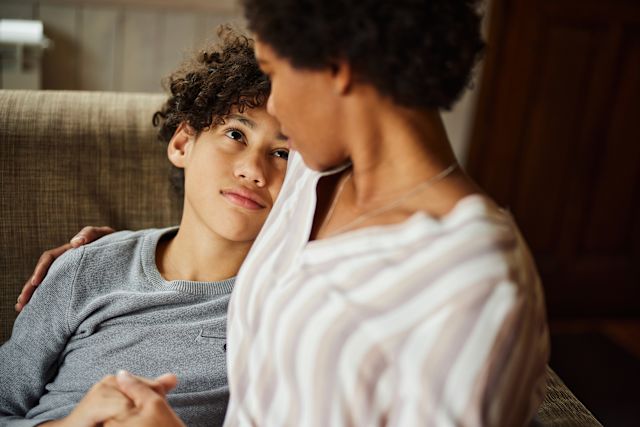Updated on December 16, 2024.
In recent years, people all over the world have been continuously exposed to stressful and often troubling news and images—from natural disasters to shootings, terrorist attacks, or armed conflicts.
Thanks to the 24-hour news cycle and the omnipresence of social media, graphic photos and videos of disturbing or upsetting scenes can be viewed by millions in a matter of seconds. And children who may be particularly vulnerable to this information may be exposed along with adults. Kids may not fully understand what's happening. They may feel they're in danger themselves. They could become confused, angry, or scared.
It’s natural to want to protect your children from frightening images or events. But it’s best that they hear about them from you, rather than from classmates or online.
How you speak to children about a crisis or tragedy depends on a few things: their age, your relationship and, of course, the incident itself. With that in mind, here are a few strategies for answering kids' questions, helping them understand, and hopefully, calming their fears.
How to talk to young children
Although they may not comprehend the details of a tragedy, even the littlest kids are often aware something bad has happened. Many fear the same could happen to them.
So, in a calm voice, explain the event simply, in a way they understand. Be honest, but don't offer unnecessary or violent details. Let them ask questions and answer as best and as clearly as you can.
Limit their exposure to TV or social media. If you must watch the news to inform yourself, try to do it when your child is already in bed and away from the screen. Understand that watching violent or distressing footage over and over again can make anxiety worse. Be aware of when and where you discuss the tragedy with other adults, as well, whether on the phone, a video chat, or in person. Kids could be listening.
Acknowledge children's feelings of sadness or fear, and comfort them with hugs and affection. Let them know you love them, and you are there to keep them safe and protected.
Remember not to brush fear, anxiety, or sadness under the rug, as if they don’t or shouldn’t exist. Instead, work with your child on healthy ways to cope. You can help your child express their feelings by talking it out or having them draw pictures or even sing. Reassure them that its’s okay to feel upset. Crying can be a healthy way to relieve stress.
How to talk to older kids and tweens
Once kids are in elementary or junior high school, they're more informed about world and national events. At the same time, they're prone to misinformation, thanks to friends and social media.
When a violent event or natural disaster happens, do your best to give accurate—though again, not gory—details. Encourage questions, and answer them simply, straightforwardly, with facts on your side. If there are questions about the news, the American Association of Pediatrics suggests recording it in advance and watching it together, taking care to pause and discuss.
As with young children, you should let older kids express their feelings. Validate their fears and let them know it’s okay to be afraid. Remember to assure them that they're safe. Bigger kids need that comfort, too.
Older children may want to help victims, as well, in which case you can work together to take action. In the wake of tragedy, it's best to give to established philanthropic organizations or verified funds; the organizers often have experience and can process and steer aid accordingly.
How to talk to teens
With more sophisticated worldviews and a better understanding of news, teenagers may not need as much comforting and as many explanations as littler kids. Then again, they might.
Start by telling them the truth. Let them ask questions and ask them questions in return—about what they think, how their friends are feeling, and whether they want to help. Provide detailed information and be prepared for passionate opinions.
Look out for signs of depression or an inability to cope, too. Children who have had general challenges with anxiety or depression before the event are likely to benefit from additional support at this time. Reach out to a healthcare provider if your child’s needs outstrip your ability to help.
What to avoid
Media can be vital in helping us fully comprehend tragedy, but unending footage of death and destruction can also wear us down, upset, and scare us, whatever our age. When children are in the house—particularly young children—limit your consumption. It'll help everyone keep a better head.
Finally, while the discussion may be difficult or uncomfortable, don't skip talking about tragedy with your kids. A fact-based discussion rooted in comfort and concern goes a long way to addressing kids' fears—and it's best that it's coming from someone who loves them.







